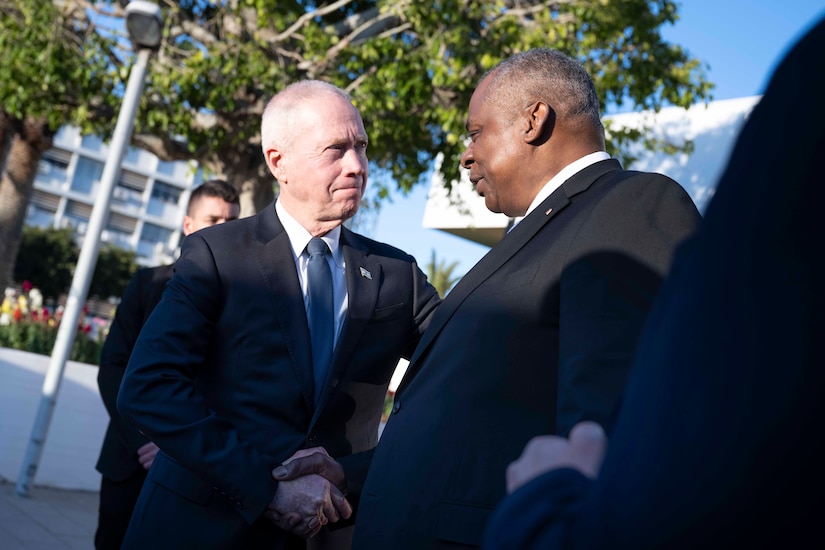Secretary of Defense Lloyd J. Austin III discussed the goals and objectives of Israel’s campaign against the Hamas terror group in Gaza with Israeli Defense Minister Yoav Gallant in Tel Aviv today.
The officials also talked about how to reduce harm to civilians in the battlespace and the need to ensure a sustained flow of humanitarian assistance into Gaza, Austin said at a news conference following the meeting. Air Force Gen. CQ Brown, Jr., chairman of the Joint Chiefs of Staff, also participated in the high-level talks.
Austin has been in near-daily contact with Gallant since Hamas launched its terror attacks on Israel Oct. 7. That attack killed more than a thousand Jews living near the Gaza Strip with hundreds of hostages, including Americans, taken by the terror group.
“I know that Israel has been profoundly changed from where you were on Oct. 6,” Austin said. “I’m here with a clear message: America’s support for Israel’s security is unshakable.”
Hamas committed atrocities during its attack on Israel. It is a continuation of its professed goals: The killing of Jews and the elimination of the Jewish state. “No country should tolerate such a danger,” Austin said. “And Israel has every right to defend itself against a fanatical terrorist group whose stated purpose is to murder Jews and eradicate the Jewish state.”
The terrorists hide among the population of Gaza and seem determined “to doom both Israelis and Palestinians to an unending cycle of suffering and strife,” the secretary said. “Democracies are stronger and more secure when we uphold the law of war. And I’ve said, protecting Palestinian civilians in Gaza is both a moral duty and a strategic imperative.”
The United States will continue to stand up for Israel’s bedrock right to defend itself, he said. “And we will also continue to urge the protection of civilians during conflict and to increase the flow of humanitarian aid into Gaza,” Austin said. “That’s important, as Israel fights to dismantle the Hamas terror infrastructure in Gaza. And it will also be crucial for our work with our allies and partners after the fighting stops.”
Both Austin and Gallant looked beyond Hamas toward the group’s sponsor: Iran. “We’re working to ensure that this conflict does not escalate beyond Gaza,” Austin said. “But as we are driving to stabilize the region, Iran is raising tensions by continuing to support terrorist groups and malicious attacks by these Iranian proxies who threaten the region and risk a broader conflict. Of course, the United States does not seek war. And we urgently call on Iran to take steps to de-escalate.”
Productive meeting today with @yoavgallant to discuss Israel’s ongoing campaign to defeat Hamas, to include objectives, phasing, and protecting civilians. We also focused on Iran-backed threats across the region, and our shared commitment to countering this aggression. pic.twitter.com/HOCKiC5yFX
— Secretary of Defense Lloyd J. Austin III (@SecDef) December 18, 2023
Austin is also looking beyond the Israeli war on Hamas. “Now, we know that the past 72 days have been some of the most painful days in Israel’s history,” he said. “But it would compound this tragedy if all that was waiting for the Israeli people and your Palestinian neighbors is at the end of this awful war, was more insecurity, fury and despair.”
Israelis and Palestinians “deserve a horizon of hope,” Austin said. It is in the interests of both people to support the “two-state solution” living side by side in mutual security. “Now we know how hard that is, especially after Oct. 7,” Austin said. “But ongoing instability and insecurity only play into the hands of Hamas. So, we must think together about what lies beyond this terrible season of terror and war.”
But the war does continue, and the U.S. and Israeli leaders discussed the complexity of the combat. Austin stressed that the battlespace is incredibly difficult with very closed spaces and a dense population. “That makes it very, very difficult to conduct any military operation,” he said. “Above and beyond that, we see that Hamas routinely uses civilians as shields.”
The terror group also sites headquarters and logistical nodes near “protected sites” like hospitals, schools, mosques and churches. This adds to the complexity and “provides an additional burden for the forces prosecuting this fight,” Austin said. “[The fight] requires a very professional force. And that force has to learn each step of the way.”









